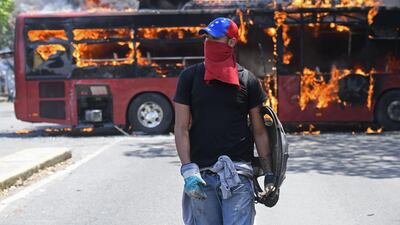In Venezuela, an attempt to quickly dismantle Nicolas Maduro’s regime has become a war of attrition, taking millions to the brink of starvation. On Tuesday, the country witnessed the most violent episode in its political crisis, which began in January when Juan Guaido declared himself interim president, drawing on the support of the US, the UK and much of Latin America. On television, Mr Maduro claimed to have defeated an “attempted coup” engineered by Mr Guaido, after supporters of both men clashed in the streets of the capital, Caracas. At least 69 people were injured, according to Venezuelan officials, while video footage appeared to show a tank ramming into protesters. Four months after Mr Guaido launched his campaign to unseat Mr Maduro, Venezuelans are no closer to a resolution.
In his six years in power, Mr Maduro has run his country into the ground. With the world’s largest known oil reserves, Venezuelans should be living a life of prosperity and able to provide the best for their children – and yet the majority are desperately poor. Lurking behind the nation’s constitutional chaos are deep socio-economic problems, which first sparked protests 18 months ago. Riven by corruption and mismanagement, the country’s economy is collapsing, leaving Venezuelans without sufficient food, medicine or power. At least three million have fled, to the alarm of neighbouring Brazil and Colombia. Yet, with the support of Venezuela’s military, Mr Maduro remains in the presidential palace. The resignation of secret police chief Manuel Ricardo Cristopher Figuera is encouraging, but there is no indication that others will follow. Mr Maduro’s politics might have brought Venezuela to the brink, but until the generals desert him, he will not contemplate stepping down.
To complicate matters further, Venezuela has become a pawn in a wider geopolitical game. While dozens of countries back Mr Guaido, the president retains the vigorous support of Russia, China and Iran. Latin America, meanwhile, is split along ideological lines, with Cuba and Bolivia denouncing Mr Guaido’s “coup d’etat” and Colombia’s Ivan Duque urging the Venezuelan army to stand “on the right side of history” and turn against Mr Maduro. Of course, Venezuelans stand to lose most from this ongoing turmoil – but there is a very real risk of a confrontation between global powers that should not be ignored.

